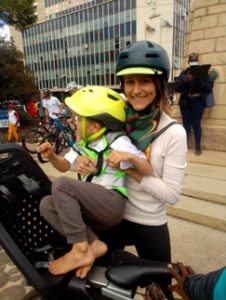The Dutch well-know that there is no better person to vehemently spark change in a city than a mother. The paediatric-trained health professional and the lawyer understand well the importance of ‘the best interest of the child’. As a place, the city is the perfect setting to regroup a society’s unchecked practices. Small enough to reach communities, large enough to be counted. The bicycle as the effector – is the Climate-Change-coup-de-grâce – in the revolution to reinvent sustainable cities in the best interests of the child. Harare is primed for this – with one African mother at the helm.
It was 4pm on a school day as a mother was driving her two boys in their private car to pick up an item left off the morning’s shopping. “Mum! Why’s that boy walking on the side of the road alone?” A fleeting observation from a seven-year-old‘s window of what would appear to be another seven-year-old. Restrained by a moving machine. Unable to ask him in person himself. A moment enough to question equity. A question mark to the unquestioned modus operandi. A missed opportunity to connect face-to-face with another child from a different background, in the natural world.
“Tomorrow, we will walk to school, and I will tell you.” Said his mum.

Climate anxiety had gripped this mother for months. Heightened by the need to protect her children. It sounds naïve to start contemplating the grave danger of our planet at thirty-something years old. For some reason, the lessons on chlorofluorocarbons (CFCs), deforestation and global warming as an eleven-year-old in the 90’s had lost its impact – or had simply been forgotten.
Immobilised by fear but repulsed by inaction. Motherhood is a leveller. It spurs change in even the most ineffectual. A child in danger goads an unstoppable force. A personal tipping point to spur change. The realisation that well-intended, but ‘herd-mentality’ choices were directly impacting on each of her children’s developmental potential, as well as their future lives. And the future lives of children like the seven-year-old walking back from school.
It is obvious that no parent would willingly endanger their child. Yet, acquiescence to Climate Change, or disinterest in the design of the built environment negatively affects child development. A child’s development is dependent on experience in a safe and healthy environment. Well-intentioned parental decisions to drive to school are influenced by social norms. The juxtaposition of making a child’s life easier and happier by limiting their experiences. The journey in a car becomes a means to an end – a disutility. Time spent in traffic is time wasted. Children learn to emulate these values. Setting a precedence in their own lives from lived experiences of what it means to be happy based on superficial parameters. Undisputedly, children of privilege suffer soaring rates of depression and anxiety higher than any other socioeconomic group. The well-intended parental aspirations to do better (more things, less discomfort) is a disservice to a child’s developmental potential.
Streets have been prioritised for machines over children. Parents’ increasing “protection” in the face of the obvious dangers emerging in the built environment is skewed and misses the root cause. The built environment which is and was created by people can be un-built. Who decided that taking a bus, walking or cycling to school was not good enough? Whoever did, and whoever followed, signalled the status quo. City planners received these messages which mirror reality. Reality which parents across the city see, but never challenge. They observe, “it’s not good enough for my child”. Where this mother now adds, “then it’s not good enough for any child”. A challenge to change. The parody of the parent of privilege displaying poverty of subliminal choice. Who is poor? The child who sets their own time, explores through spatial navigation whilst submersed in nature, and learning consequences of their tardiness (missed meals, playtime etc)? Or the child who is chaperoned in an earth-polluting vehicle according to someone else’s timetable and priorities?
The solution? To start. The talk of walking to school ‘tomorrow’. To be a good role model and take action, one foot in front of the other. One hard conversation after another about value systems that are broken in society. And so from the humble decision to start well with the small things, flourished a habit of cycling to school; the cycling school bus; Harare Bike Day, community separation-at-source waste recycling on bicycles; advocacy for cycle tracks; building one; and, starting conversations that plant seeds of change within citizens of Harare.
A COP27 for more walkable African cities
Our beloved continent will host the COP this November in Egypt. This is an opportunity for our leaders to come together to find ways to strengthen community initiatives to make African cities more walkable. African communities, such as those in Harare, are already showing great resilience and innovation in their approaches to mitigating the risks of poor infrastructure. However, their efforts have limits. The long-term and sustainable solution is for urban transport and development planners to integrate the walking experiences and behaviour of local residents into their planning. Our leaders should commit to promoting inclusive African cities where residents are not captive walkers but walk because it is accessible, safe and enjoyable to do so.

Jenna Hutchings — Bio
Jenna supports the City as a citizen of Harare encouraging individuals, corporates, private and public sectors to join together to co-create a sustainable city. She believes that everyone has a skill set that can be yoked to assist in the biggest challenge of our time – mitigating Climate Change. Bicycles seem like the solution to a lot of city-living problems in Harare. Busy streets, air pollution, access, child development, solid waste management, health, and community development. She is proudly advocating for the City of Harare to achieve these goals.


Leave a Reply